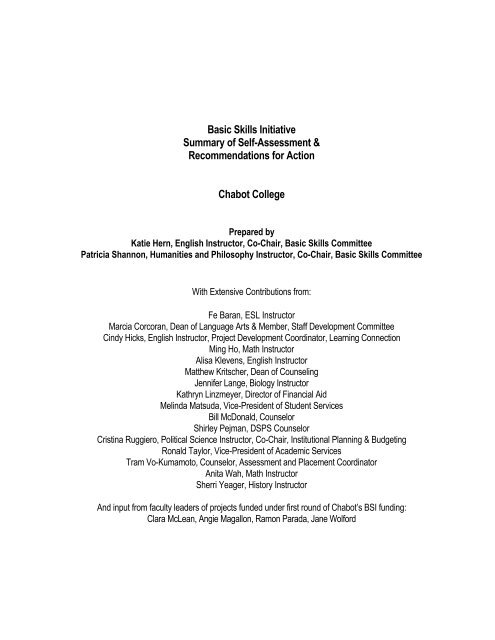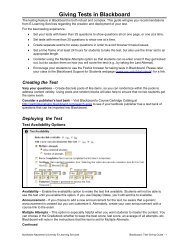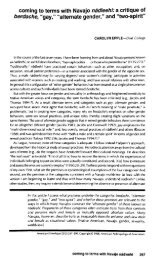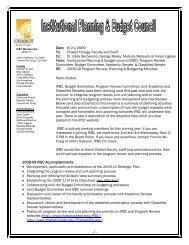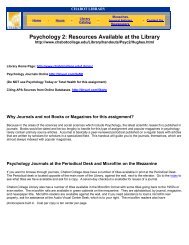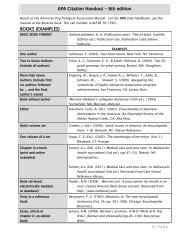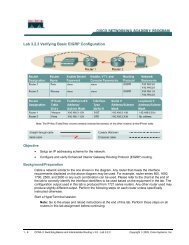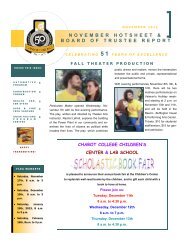BSI Self-Assessment Summary.rtf - Chabot College
BSI Self-Assessment Summary.rtf - Chabot College
BSI Self-Assessment Summary.rtf - Chabot College
You also want an ePaper? Increase the reach of your titles
YUMPU automatically turns print PDFs into web optimized ePapers that Google loves.
Basic Skills Initiative<br />
<strong>Summary</strong> of <strong>Self</strong>-<strong>Assessment</strong> &<br />
Recommendations for Action<br />
<strong>Chabot</strong> <strong>College</strong><br />
Prepared by<br />
Katie Hern, English Instructor, Co-Chair, Basic Skills Committee<br />
Patricia Shannon, Humanities and Philosophy Instructor, Co-Chair, Basic Skills Committee<br />
With Extensive Contributions from:<br />
Fe Baran, ESL Instructor<br />
Marcia Corcoran, Dean of Language Arts & Member, Staff Development Committee<br />
Cindy Hicks, English Instructor, Project Development Coordinator, Learning Connection<br />
Ming Ho, Math Instructor<br />
Alisa Klevens, English Instructor<br />
Matthew Kritscher, Dean of Counseling<br />
Jennifer Lange, Biology Instructor<br />
Kathryn Linzmeyer, Director of Financial Aid<br />
Melinda Matsuda, Vice-President of Student Services<br />
Bill McDonald, Counselor<br />
Shirley Pejman, DSPS Counselor<br />
Cristina Ruggiero, Political Science Instructor, Co-Chair, Institutional Planning & Budgeting<br />
Ronald Taylor, Vice-President of Academic Services<br />
Tram Vo-Kumamoto, Counselor, <strong>Assessment</strong> and Placement Coordinator<br />
Anita Wah, Math Instructor<br />
Sherri Yeager, History Instructor<br />
And input from faculty leaders of projects funded under first round of <strong>Chabot</strong>’s <strong>BSI</strong> funding:<br />
Clara McLean, Angie Magallon, Ramon Parada, Jane Wolford
Effective Practice Area A: Institutional Commitment and Priority<br />
A.1: Developmental Education is a Clearly Stated Institutional Priority<br />
Developmental education has been an explicit priority in various institutional documents and activities in<br />
recent years – e.g. strategic plan, Basic Skills Initiative projects, plans for Title 3 grant, Carnegie grant<br />
activities, expanded tutoring under Learning Connection. Additionally, positions in English and Math<br />
have been prioritized in faculty hiring decisions, with basic skills instruction explicitly included in<br />
position descriptions. Even with these positive trends, questions remain about whether resources are<br />
sufficient to provide effective support services for developmental students, or for faculty to engage in<br />
the kinds of practices that yield stronger outcomes for these students (e.g.: limited professional<br />
development opportunities, 44-student class size in developmental math, teaching load for general<br />
education faculty – 5 classes of 44 students per term).<br />
A.2: A clearly articulated mission based on a shared, overarching philosophy drives the<br />
developmental education program. Clearly specified goals and objectives are established for<br />
developmental courses and programs.<br />
There is no single “developmental education program” at <strong>Chabot</strong>. There are developmental-level<br />
courses in Math, English, and ESL, and various support services (e.g.: DSPS, Learning Connection,<br />
Counseling). Additionally, faculty in “non-developmental” disciplines teach developmental students in<br />
transfer-level classes without pre-requisites. Because developmental education is so decentralized,<br />
there is no single mission or over-riding philosophy, and there has been no forum for goal setting on<br />
developmental education as a whole.<br />
Each area deals with these issues separately in various ways (e.g.: unit plans, program reviews,<br />
ongoing curricular work). In English, for example, the developmental education philosophy is articulated<br />
in two key documents, the “Throughline” and “Articulated Assumptions,” both of which are shared with<br />
all newly hired faculty are referred to regularly in faculty gatherings. One of the principles this<br />
philosophy is that students in basic skills classes should engage in the same kinds of skills/habits of<br />
mind/practices as students in transfer-level English classes (reading and critically responding to fulllength<br />
books, writing argument-based essays), but that the classes should provide them with greater<br />
scaffolding and support, longer instructional periods, more accessible texts, and more explicit attention<br />
to “student-ing skills.” As is typical across the college, communication about this has generally<br />
occurred within English, but not much beyond it.<br />
Goal setting occurs across the college through unit plans, but our planning does not typically involve<br />
specific focus on developmental education. Additionally, it often focuses on institutional goals (FTE/<br />
WSCH, staffing, fiscal matters), rather than goals for improving specific student outcomes. For<br />
example, to what extent do we set goals for increasing retention within the semester, or increasing<br />
engagement rates across the curriculum, or persistence from one semester to the next? This might be<br />
an area for the college-wide Basic Skills Committee to pursue.<br />
A.3: The developmental education program is centralized or highly coordinated.
As noted above, developmental education at <strong>Chabot</strong> is de-centralized and has been minimally<br />
coordinated. Budgeting for developmental education is subsumed within larger division budgets. A<br />
movement toward greater coordination is evident in the integration of student tutorial services under the<br />
Learning Connection and the creation of a college-wide Basic Skills Committee. Formal and informal<br />
mechanisms exist for faculty within developmental disciplines to discuss instructional issues (Math’s<br />
long-standing Basic Skills faculty group, English “Talking about Teaching: English 102” series and<br />
ongoing workshops/retreats, ESL’s regular faculty workshops). Cross-disciplinary conversations about<br />
basic skills education have historically been limited to special programs (e.g.: learning communities),<br />
but have recently occurred more broadly among faculty involved in the Learning Connection, in Flex<br />
Day programs (e.g. college-wide viewing & discussion of video Reading Between the Lives), and<br />
among faculty participating in projects funded by Basic Skills Initiative or Carnegie grant. This is a<br />
promising trend for the Basic Skills Committee to build upon.<br />
A.4: Institutional policies facilitate student completion of necessary developmental<br />
coursework as early as possible in the educational sequence.<br />
<strong>Assessment</strong>, orientation, and placement are encouraged at <strong>Chabot</strong> through registration incentives, and<br />
students who see counselors are advised to take developmental coursework early. However, many<br />
students do not participate in these processes, and few pre-requisites block them from enrolling in<br />
transfer-level courses outside of English, Math. We do not have clear data on how many complete<br />
developmental coursework early and how many postpone these (often dreaded) classes. There is some<br />
disagreement among members of the Basic Skills Committee about the advisability of requiring<br />
students to pass a series of pre-requisites to gain entry to college-level courses. Institutional data on<br />
student performance is regularly monitored within divisions (e.g. English, Math, Counseling) and used<br />
for program planning and student advising.<br />
A.5: A comprehensive system of support services exists and is characterized by a high degree<br />
of integration among academic and student support services.<br />
This has been an area of significant focus and investment in the last few years, as separate support<br />
services (e.g. Math Lab, WRAC lab, Language Lab) have been integrated under the new college-wide<br />
Learning Connection, and support services have been developed in new disciplines. Services take<br />
many forms, (e.g.: individualized instruction from faculty, student-led supplemental instruction, peer<br />
learning assistants embedded in the classroom, subject-matter peer tutors, study groups). Faculty from<br />
the following disciplines currently serve as liaisons and/or tutor trainers: English, math, world<br />
languages, speech and communications, ESL, chemistry, life sciences. Student learning assistants<br />
provide support in classes in the following disciplines: business, CAS, art, anatomy, math, chemistry,<br />
English, ASL, Learning Skills, ECD, world languages. The Learning Connection plans to expand these<br />
offerings further through a “bottom up” approach in which instructors and staff across the curriculum<br />
identify learning needs, and the Learning Connection works with them to create and then to<br />
institutionalize successful pilots to address those needs. As the Learning Connection moves into its<br />
next phase of development, one area for attention involves gathering data to systematically assess its<br />
support services, then sharing those results with the broader college.<br />
A.6: Faculty who are both knowledgeable and enthusiastic about developmental education are<br />
recruited and hired to teach in the program.
This is a given in disciplines like ESL and Learning Skills. Enthusiasm about developmental education<br />
has also been an explicit criterion of the last several rounds of full-time hiring in English, where all<br />
faculty are expected to teach both developmental and transfer-level courses. Throughout much of the<br />
college, however, faculty are hired for their discipline-specific expertise, and while many have teaching<br />
experience, many do not have training or expertise in teaching, nevermind specific training in<br />
developmental education. Individual faculty may pursue their own professional development in this<br />
area, but aside from recent grant-funded projects, this has not been an organized effort across the<br />
college.<br />
A.7: Institutions manage faculty and student expectations regarding developmental education.<br />
It is hard to assess the extent to which this is occurring at <strong>Chabot</strong>, as it occurs in such disparate<br />
contexts (faculty syllabi, individual classrooms, tutoring, student services, groups of faculty working<br />
within disciplines or in special projects). At a college-wide level, recent videos produced under the<br />
Carnegie grant use student voices to illuminate the question of student and faculty expectations<br />
(Reading Between the Lives – video on student/faculty expectations in reading, Going the Distance –<br />
video on the expectations/demands of being successful in distance education formats). A new video is<br />
currently planned in collaboration with Student Services to address what being a college student<br />
involves, and the services available to students at <strong>Chabot</strong>.
Effective Practice Area B: Program Components<br />
B.1: Orientation, assessment, and placement are mandatory for all new students.<br />
Orientation, assessment, and placement are voluntary for new students at <strong>Chabot</strong>, rather than<br />
mandatory. Student services has set up incentives to encourage students to participate in orientation<br />
and assessment, with points awarded that give earlier registration dates to participating students. We<br />
don’t currently have solid numbers about the percentage of new students who participate, but data from<br />
the Office of Institutional Research indicates that new students participating in assessment and<br />
orientation persist and succeed at a higher rate than those who do not.<br />
There was significant interest among the Basic Skills Committee in exploring the question of mandatory<br />
assessment, placement, and orientation at <strong>Chabot</strong>. Faculty within Math and English expressed interest<br />
in examining and possibly changing parts of the assessment/placement process in their areas. Faculty<br />
in other disciplines spoke of the challenges posed by the lack of pre-requisites in their transfer-level<br />
classes. There were significant differences of opinion on the question and concerns about the impact of<br />
such policies.<br />
B.2: Regular program evaluations are conducted, results are disseminated widely, and data<br />
are used to improve practice.<br />
<strong>Chabot</strong> has instituted a new Program Review process in the last several years, and basic skills were<br />
identified as a key area for programs to investigate. Program evaluations occur regularly, though results<br />
do not appear to be widely available to the college community. We were not able to evaluate the extent<br />
to which data are used to improve practice. As an ongoing, college-wide process, Program Review<br />
represents a potential partner in building a college-wide, coordinated effort to strengthen basic skills<br />
education.<br />
B.3: Counseling support provided is substantial, accessible, and integrated with academic<br />
courses/programs.<br />
Counseling support is integrated with academic instruction in special programs like the Daraja, Puente,<br />
and Springboard Learning Communities, as well as EOPS and Aspire. However, for students in the<br />
general curriculum, access to substantial counseling is limited, and there are no specific initiatives<br />
targeted toward developmental students.<br />
B.4: Financial aid is disseminated to support developmental students. Mechanisms exist to<br />
ensure that students are aware of such opportunities and are provided with assistance to<br />
apply for and acquire financial aid.<br />
Financial aid is disseminated to all <strong>Chabot</strong> students, including those who assess into developmental<br />
coursework (92% of the new students in Fall 2007). Over the last several years, expanded outreach<br />
has significantly increased the number of students receiving financial ad and the amounts of aid<br />
awarded (e.g.: The Financial Aid Office reports that between 00-01 and 07-08, the number of Cal grants<br />
awarded has increased 149%). In their self-assessment, the Financial Aid office expressed concerns<br />
about their reliance on soft, categorical funding sources and the limited staff time available for personal<br />
guidance to students.
Effective Practice Area C: Staff Development<br />
C.1: Administrators support and encourage faculty development in basic skills, and the<br />
improvement of teaching and learning is connected to the institutional mission.<br />
C.2: The faculty play a primary role in needs assessment, planning, and implementation of<br />
staff development programs and activities in support of developmental education programs.<br />
C.3: Staff development programs are structured and appropriately supported to sustain them<br />
as ongoing efforts related to institutional goals for the improvement of teaching and learning.<br />
C.4: Staff development opportunities are flexible, varied, and responsive to developmental<br />
needs of individual faculty, diverse student populations, and coordinated programs/services.<br />
C.5: Faculty development is connected to intrinsic and extrinsic faculty reward structures.<br />
The relationship between staff development and basic skills education has emerged recently through<br />
several different projects, particularly as funded by the state Basic Skills Initiative and the Carnegie<br />
grant. The individuals participating in these projects, of course, received the most direct professional<br />
development around basic skills education, but benefits of this work have spread to the college at large<br />
through forums like Flex Day (e.g. screenings and discussions of Carnegie-funded videos Reading<br />
between the Lives and Going the Distance; workshops featuring results from basic skills projects in<br />
Math, History, the Puente Project, service learning, Springboard to Transfer, research into the<br />
“academic sustainability gap” holding back so many developmental students). Beyond these projects,<br />
the long-standing New Faculty Group has been a place where new full-time instructors receive training<br />
and support in some of the effective classroom practices highlighted in the <strong>BSI</strong> Literature Review (e.g.<br />
using Classroom <strong>Assessment</strong> Techniques, designing good reading assignments). Faculty/staff<br />
participating in special programs (e.g.: EOPS, Puente) also receive regular professional development,<br />
some relating to basic skills education.<br />
Outside of specific projects/programs, there has been little coordinated, college-wide attention to the<br />
area of developmental education. Staff development funds are overseen by a committee that includes<br />
developmental faculty, but these funds are distributed for conference-attendance in general (not<br />
developmental education in particular). Staff development in developmental education has been<br />
constrained by two main factors: limited time for faculty to come together, limited financial resources to<br />
organize and fund such work. <strong>College</strong> hour has been eroded by construction-related scheduling<br />
changes, and while the quality of recent Flex Day offerings has been strong, two days a year are not<br />
sufficient time for faculty to come together on matters of teaching and learning. Many members of the<br />
committee expressed interest in expanding professional development opportunities in developmental<br />
education – both within their disciplines (with funding for adjunct faculty to participate) and across<br />
disciplines. This need has also been highlighted in the proposal being drafted now for a Title 3 grant,<br />
and as an area for future attention within a new Center for Teaching and Learning to be housed within<br />
the college-wide Learning Connection.
Effective Practice Area D: Instructional Practices<br />
D.1: Sound principles of learning theory are applied in the design and delivery of courses in<br />
the developmental program.<br />
D.2: Curricula and practices that have proven to be effective in specific disciplines are<br />
employed.<br />
D.3: The developmental education program addresses the holistic development of all aspects<br />
of the student. Attention is paid to the social and emotional development of students, as well<br />
as to their cognitive growth.<br />
D.4: Culturally Responsive Teaching theory and practices are applied to all aspects of the<br />
developmental instructional programs and services.<br />
D.5: A high degree of structure is provided in developmental education courses.<br />
D.6: Developmental education faculty employ a variety of instructional approaches to<br />
accommodate student diversity.<br />
D.7: Programs align entry/exit skills among levels and link course content to college-level<br />
performance requirements.<br />
D.8: Developmental education faculty routinely share instructional strategies.<br />
D.9: Faculty and advisors closely monitor student performance.<br />
D.10: Programs provide comprehensive academic support mechanisms, including the use of<br />
trained tutors.<br />
Despite its central importance, Area D is the shortest section of our self-assessment. This is in part<br />
because many of the above issues have been addressed in earlier sections, such as the integration<br />
and expansion of tutoring services under the Learning Connection, questions about entry/exit<br />
requirements related to assessment and placement, the insufficient time and funding available for<br />
faculty to share instructional strategies, and the limited staff development targeted to developmental<br />
education.<br />
Because most of the above instructional practices are dispersed across a wide range of courses and<br />
instructors (in <strong>Chabot</strong>’s decentralized and minimally coordinated developmental education “program”), it<br />
is difficult to assess how extensively practices like D1-D5 occur. The above list of effective practices<br />
does, however, provide guidance we can use in our upcoming work to design professional development<br />
activities, curricular changes, and academic support services to strengthen developmental education at<br />
<strong>Chabot</strong>.
Strengthening Basic Skills Education at <strong>Chabot</strong><br />
Draft Recommendations:<br />
Setting the Course for Basic Skills Committee & <strong>BSI</strong> Expenditures<br />
2008-2009 and Beyond<br />
Introduction<br />
The following recommendations for action emerged from <strong>Chabot</strong>’s Basic Skills <strong>Self</strong>-<strong>Assessment</strong>,<br />
conducted by the Basic Skills Committee and synthesized by committee co-chairs Katie Hern and<br />
Patricia Shannon. The recommendations reflect areas where committee members noted significant<br />
interest and need at the college. They fall into four major categories:<br />
1) Academic Policy: Consideration of mandatory orientation, assessment, and/or placement<br />
2) Professional Development: Effective Instructional Practices in Basic Skills Education<br />
3) Direct Support for Developmental Students: Tutorials and Counseling Services<br />
4) Curricular Review and Change: Strengthening Student Outcomes<br />
A common philosophical theme ran through the self-assessment: We are all basic skills instructors.<br />
Given this, our recommendations reflect not only activities in English, Math, ESL, but efforts to<br />
strengthen basic skills across the disciplines and in key student services areas.<br />
Recommendations<br />
1) Carefully study issues involved in adoption of mandatory orientation, assessment,<br />
and/or placement at <strong>Chabot</strong>. Develop policy recommendations. (<strong>BSI</strong> effective practices, Area<br />
A)<br />
Participants:<br />
Basic Skills Sub-Committee including Counseling and Instructional faculty in English,<br />
Math, transfer-level G.E. disciplines. Support from Institutional Research office.<br />
Other members as interested.<br />
Overview of Charge:<br />
Faculty Inquiry Group (FIG) to analyze institutional data and external literature on<br />
feasibility and impact of such policies, from open-minded scholarly standpoint (rather<br />
than polemical/advocacy standpoint), to develop recommendations. Investigation<br />
should include (but not be limited to):<br />
Attention to discipline-specific concerns with assessment/placement<br />
processes, such as questions in English about cut scores for English 102<br />
and for directing students to ESL/Learning Skills, questions in math about<br />
expanding assessment process to include guidance on student weaknesses/<br />
strengths (instead of using placement simply to “get them in the right<br />
course”)
Attention to the question of pre-requisites in transfer level g.e. courses<br />
Attention to student equity & access issues involved in such policies<br />
Examination of data on success rates of developmental-level students<br />
enrolled in college-level courses<br />
Attention to financial implications, such as the impact on enrollments and the<br />
resources needed to support these policies<br />
Consideration of the mixed findings about mandatory placement in<br />
community college settings (described in <strong>BSI</strong> Literature Review)<br />
2) Increase Professional Development Opportunities re: Effective Practices in<br />
Developmental Education (<strong>BSI</strong> Areas C2-C4 & D)<br />
Participants:<br />
Faculty/staff from across the college – in traditional developmental disciplines<br />
(English, Math, ESL, Learning Skills, tutorials, counseling) as well as in transfer-level<br />
disciplines that serve large numbers of basic skills-level students. Staff/faculty/<br />
administration involved in <strong>Chabot</strong>’s emerging Center for Teaching and Learning.<br />
Members of Staff Development Committee.<br />
Sample Activities:<br />
• “Grounds up” proposals submitted from across college to fund developmental education<br />
activities in their areas (e.g. Workshops on Active Learning pedagogies for Social Science,<br />
professional development activities to train additional faculty in Mastery Learning approaches piloted in<br />
Math under first round of Basic Skills funds).<br />
• Opportunities organized by the Center for Teaching and Learning, especially cross-disciplinary<br />
activities, such as trainings in Reading Apprenticeship pedagogy and participation in an ongoing Faculty<br />
Inquiry Group of instructors trying these approaches in their classes.<br />
• Faculty Inquiry Groups of faculty who commit to trying new instructional practices from Basic<br />
Skills Lit Review (Area D), then come together regularly to share results from their classes, get<br />
feedback & support<br />
• Staff-development committee funding for attendance at conferences specifically devoted to<br />
developmental education<br />
Guidelines & criteria for implementing these activities to be developed in early<br />
2008-2009 by Basic Skills Committee
3) Expand & Strengthen Supplemental Academic & Counseling Support in Basic Skills<br />
(Effective Practice Areas B…D…)<br />
Participants:<br />
Collaborations between Basic Skills Committee, Learning Connection, Counseling,<br />
and Faculty from Relevant Disciplines (whether serving on committee or not)<br />
Sample Activities highlighted in committee members’ bsi assessments:<br />
• Further expand tutorial support in Learning Connection to include disciplines/areas/skills not<br />
currently represented<br />
• Create new peer-tutoring support for reading across the curriculum<br />
This need has been widely stressed across the campus, by both students<br />
and faculty from different areas (the video Reading Between the Lives, selfassessment<br />
by Science area, recognition by English faculty that the WRAC<br />
Center -- Writing and Reading Across the Curriculum – has become primarily<br />
a writing center over time).<br />
• Assess effectiveness of pilot projects in Learning Connection, share results with Basic Skills<br />
Committee & other parts of college<br />
• Investigate effective models for better integrating counseling and academic instruction at the<br />
developmental levels, develop recommendations for new policies/practices at <strong>Chabot</strong>.<br />
4) Curriculum Review and Change<br />
Several members of the Committee raised specific ideas about curricular changes to<br />
strengthen basic skills education in English and Math, as well as other disciplines (Social<br />
Science, the Sciences). There was interest in using Basic Skills funding to support extensive<br />
assessment and review of the elements of the current curriculum, to develop curricular<br />
changes that would improve student outcomes. The literature review on Effective Practices in<br />
Basic Skills would be a primary source guiding this work.


